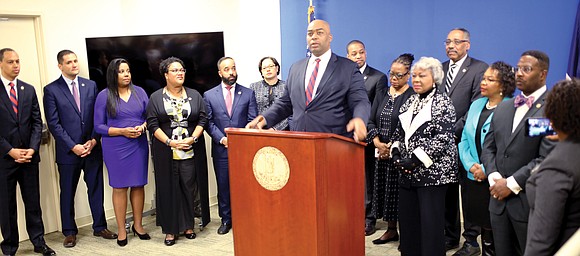Education funding, voting rights top Virginia Legislative Black Caucus’ 2019 priorities
By Daniel Berti/Capital News Service | 1/11/2019, 6 a.m.

The Virginia Legislative Black Caucus on Wednesday outlined a legislative agenda that addresses education, civil rights, voting rights and criminal justice reforms.
On the first day of the General Assembly’s 2019 session, the 21-member caucus declared its support for a number of policy proposals that the lawmakers said would improve the lives of underprivileged Virginians.
The group’s priorities include improvements to the state’s public school system. Sen. Jennifer McClellan, D-Richmond, said the caucus will join Gov. Ralph S. Northam in pushing for increased state funding for education.
“We are committed to fighting anything that takes money out of the K-12 system, anything that undermines public education in Virginia,” Sen. McClellan said. “We will fight tooth and nail to make sure that doesn’t happen.”
Sen. McClellan also declared the caucus’ support for the Equal Rights Amendment to the U.S. Constitution, which would guarantee equal rights on the basis of gender. Five resolutions have been introduced in the Senate and House of Delegates to have Virginia ratify the ERA.
The amendment has been ratified by 37 states, one short of the 38 required. However, the deadline to ratify the amendment has expired, and experts disagree over whether it still can be approved.
“You’ll hear a lot of arguments today about all the terrible things that will happen if we dare to deem women equal under the law,” Sen. McClellan said. “Well, the Virginia Constitution already does it; it’s time the U.S. Constitution does, too.”
This year marks the 400th anniversary of the Virginia House of Delegates, originally known as the House of Burgesses. But caucus members noted that it has been only 35 years since the first African-American woman was elected to the House.
The late Yvonne Miller was elected as a state delegate in 1983 and a state senator in 1987, serving in that position until her death in 2012.
There are currently 11 African-American women in the Virginia Legislature. Delegate Lamont Bagby, a Democrat who represents Henrico County, serves as chair of the caucus.
The caucus has also put its weight behind changes to Virginia’s voting laws. Sen. Mamie Locke, D-Hampton, voiced support for a constitutional amendment that would automatically restore the civil rights of felons who have completed their sentences and paid restitution.
“The only requirement for voting should be turning 18 years old, being a resident of the locality where you live, and to be a registered voter,” Sen. Locke said. “In a democracy, voting is not a privilege. It is a right of democracy. So we are certainly trying to, as a caucus, ensure that voters in this commonwealth exercise that right.”
Del. Jeffrey Bourne, D-Richmond, discussed efforts to reform the criminal justice system.
“What you will see from this caucus will be common sense, progressive policy proposals that make sure everyone is treated equally, fairly under the law,” Delegate Bourne said.
Lt. Gov. Justin Fairfax also made an appearance at the news conference. Lt. Gov. Fairfax, who is the second African-American to be elected to statewide office in Virginia, highlighted the caucus’ 2018 achievements but added that there is still plenty of work to do.
“What we see in Washington and around this country are people who wish to divide us,” he said. “This caucus is focused on making sure that we move forward united to provide opportunity for everyone, no matter the color of their skin, where they live or who they love.”







